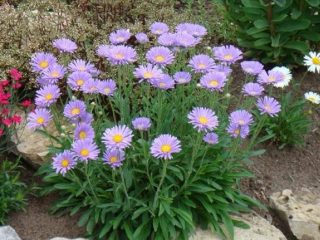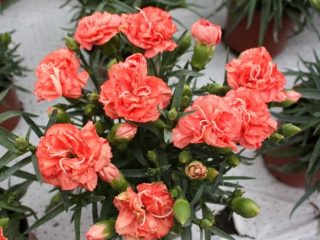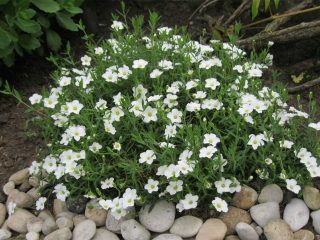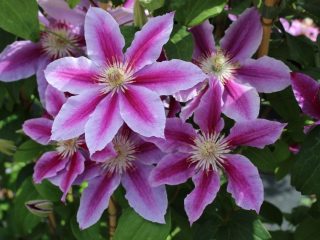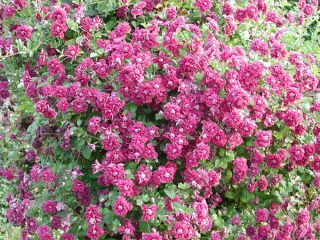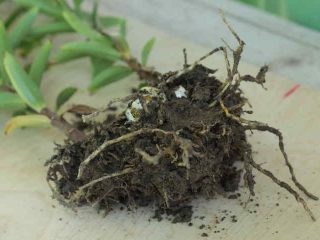Content
Beautiful and easy-to-care flowers immediately become favorites of gardeners and quickly spread. Thus, the Casablanca lily is the most popular variety; it is actively grown in Russia and the CIS countries. Despite the simple delicate coloring, it looks very impressive.
History of selection
The Casablanca lily is an oriental hybrid native to the Netherlands. Dutch breeders developed this variety in 1984. The originator is Vletter en Den Haan.

The Casablanca variety is a hybrid of the white oriental lily.
Description of the Casablanca lily with photo
The Casablanca lily is a beautiful flower that retains its decorative value throughout the season. It belongs to the bulbous type plants. Tubers form a well-developed root system. The bush consists of powerful shoots that reach a height of 120 cm. The larger the circumference of the bulb when planted, the higher the lily will grow.

The plant has many long dark green leaves, they have a glossy surface with pronounced veins
Inflorescences with large buds are formed on strong shoots. On one stem the number of flowers can reach up to 15 pieces.The diameter of a fully opened bud reaches 30 cm. They are star-shaped; they are formed by three petals and three sepals, which are similar to each other. The flowers are painted white, which can turn into a milky shade. The petals are oblong, with a wavy edge.

The Casablanca variety is often used to create wedding bouquets.
There are several stamens inside the flower. At their ends there are heavy yellow anthers. When flowering, the lily exudes an unobtrusive and pleasant aroma.
Features of flowering
The start of flowering depends on the time of planting. If it was planted in the autumn, the plant will bloom in June. If planting in open ground was in the spring, the buds will bloom only at the end of July.
The variety blooms for a long time (about a month). When cut, flowers also do not fade for a long time.

The Casablanca variety is not afraid of bad weather, the petals do not fall off from rain
Winter hardiness
This variety of lily has good frost resistance and can withstand temperatures down to -30 OC. If in the growing region of Casablanca frosts do not fall below -15 OC, then the bulb can be left in open ground. If it is colder in winter, then the lily needs to be covered so that it does not die.
Advantages and disadvantages
The lily blooms for a long time, but to prevent the buds from falling off longer, you need to ensure that the soil is moist. But you shouldn’t over-water it, as this can cause the bulb to rot.

The Casablanca variety loves well-lit areas
Advantages:
- large buds;
- long flowering;
- pleasant aroma;
- good winter hardiness.
Flaws:
- does not tolerate low temperatures;
- does not tolerate waterlogging.
Planting a Casablanca lily
To plant Casablanca lilies, you should choose sunny or slightly shaded places, protected from gusts of wind. The bush grows a lot, so it requires enough free space. The lily grows best in well-drained soil with plenty of organic matter. Peat soil with the addition of humus and sand is well suited.
The best time to plant Casablanca lilies is April-May. Planting is allowed in early autumn. An important condition is that the earth must be warmed up to +8-10 OC. The plant loves loose soil, so the area needs to be dug up before planting. The hole for the bulb should be at least 20 cm. You can add sand and ash to the bottom. Before planting the bulb in open ground, it is recommended to keep it for an hour in a solution of potassium permanganate. After this, place it in the hole and cover it with soil.
Casablanca Lily Care
This type of lily requires regular watering. It is recommended to moisten the soil 2-3 times a week. The frequency depends on the amount of precipitation. It is recommended to water only in the morning, pouring water under the root of the plant. Around the bush you need to remove weeds and loosen the soil. If the stems are too tall, they should be tied to a support.
Casablanca lilies need to be fertilized in the spring. Nitrogen-based fertilizers are well suited for this. During the flowering period, it is recommended to use fertilizers with phosphorus and magnesium.

In autumn, lilies need potassium fertilizing
After flowering ends, you need to cut off about 20 cm of shoots, and cut off the remaining ones in the fall. Before the arrival of frost, you should cover the plant with dry leaves or spruce branches.You can additionally use non-woven material. If you don’t want to cover the lily, you can dig up the bulbs and plant them again in the spring. Store them in a cool place, around 0 OC. The plant should be opened only when the likelihood of repeated frosts has passed.
In the fall, before covering the plant, you can cover the planting with film. This will help keep the onion dry. If it is wetted by rain and then covered, this can lead to its rotting, and in the spring the lily will die.
Reproduction
Casablanca lilies are propagated by babies that form on the bulbs. They grow quickly, so it is recommended to divide nests every three years. If this is not done in a timely manner, the bush will grow and it will become cramped. The bulbs will become loose and susceptible to fungal diseases. Therefore, propagation by children will help not only to obtain new Casablanca lily bushes, but also to preserve old ones.

The plant is perennial; every few years it needs to be replanted to a new location.
After flowering has finished, it is worth cutting off the shoots and digging up the Casablanca lily bulbs. It is recommended to separate and sort the resulting children. Large tubers (more than 2 cm in diameter) need to be planted in a permanent place. Small specimens should be placed in a temporary bed to allow them to grow. In regions with cold climates, it is better to postpone planting new bulbs until the spring, when the frosts have passed.
Conclusion
Casablanca Lily is a beautiful and spectacular variety that will become the highlight of the garden plot. It is multifunctional: suitable for single and group plantings, and looks great in bouquets.With proper care, it will delight its owners with large flowers.
Reviews of the Casablanca lily

